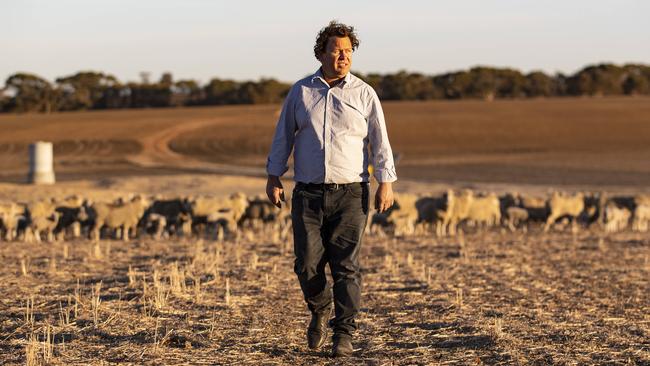Live sheep export ban to clip wool production
A new report reveals the knock-on effects of the Albanese government’s plan to end live sheep exports.

Australia’s merino sheep flock will significantly diminish and the size of the western wool industry will shrink by up to 15 per cent if live sheep exports are banned.
Research into the effects of the Albanese government’s plan to ban the trade shows the extended ramifications of the shutdown would force farmers out of raising sheep for meat and wool.
The research by market intelligence service Mecardo showed reduced livestock values in Western Australia would result in more farmers using their land to grow crops, increasing risk and putting pressure on bulk grain handling infrastructure already facing severe bottlenecks.
The cost of trucking sheep west to east has risen 60 per cent since 2017, contributing to discounted stock values for WA producers but that reduced value was somewhat alleviated by access to export markets. “Analysis of the WA marketplace shows when live export carriers are actively buying, this short-term demand may have added about $5.50 per head to lamb prices in 2022,” the report says.
“Removing live export as a market channel may see producers changing their enterprise type, product focus or flock composition, leading to flow-on effects for dependent markets such as wool and bull live export and/or supporting services such as grain logistics and handling.”
The live export trade is a feature of the WA sheep market, which has significant structural differences to markets in eastern states because of climate, remoteness and transport costs.

The report shows WA sheep producers rely on the export market as a “relief valve” because it gives them the ability to sell sheep varieties that wouldn’t normally find a high value in the domestic market.
It gives producers confidence that they can run optimal stocking densities and ensures greater productivity and diversity in their businesses.
Without access to exports, WA’s flock, which is 84 per cent merino, would follow eastern states into producing other breeds that fatten faster.
“The key thing about the live export is that it takes a slightly older sheep and that fits in well with the production systems in the West,” Mecardo Director Rob Herrmann said.
“Those self-replacing merino flocks can run at close to the optimum stocking rate because they know that when the season does turn they’ve got an ability to de-stock quickly.
“The knock-on effect to the wool industry is probably the sleeper in this.
“WA produces about 20 per cent of the Australian wool clip. It’s not unreasonable to think we could see a 15 per cent reduction.”
Without Australian sheep, Middle Eastern buyers would find other suppliers of live stock, the report said.
Kelly Freeman, the managing director of Nutrien Ag Solutions, which owns Mecardo, said the research had been commissioned to provide hard data to the emotive debate around banning sheep exports.
“Producers in Australia are some of the most efficient, sustainable, safe and reliable in the world and anytime we shut off access for an Australian producer to markets that desire our production, where we’re the natural supplier, that‘s just that’s not in the best interests of agriculture globally, and certainly not in the best interests of the Australian producer,” Mr Freeman said.
WA livestock producers have been campaigning against the government’s proposal.
Steven Bolt, who breeds merino sheep in the central wheatbelt district of Corrigin, said some farmers were already changing their business structure, resulting in less sheep and more cropping.
“It reduces us to one income stream, which takes away risk management for our business,” Mr Bolt said.
“In our business it‘s about having an exit strategy for numbers of sheep when the seasonal conditions go against you.
“Live export fulfils that and protects the welfare of our breeding stock on farms.
“Removing live export has a huge impact on the whole farming system within WA.”








To join the conversation, please log in. Don't have an account? Register
Join the conversation, you are commenting as Logout